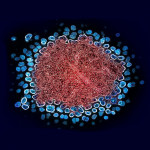Speaking with POZ from his home in Vancouver, Washington, comic book creator Darren Davis recalls his fondest career accomplishments. He talks animatedly about flexing his marketing muscle at companies such as E! Entertainment Television and USA Networks, but this self-proclaimed geek truly gets excited when he recounts landing a job at WildStorm, a subsidiary of DC Comics.
“I got to work with some of the top people in the industry,” Davis, 41, gushes. He wound up working for Wizard, a popular comic book news magazine and price guide. While triumphant professionally, Davis received a not-so-super HIV diagnosis in 1999. Career kryptonite, it seemed. “I was let go around the exact same time I was diagnosed,” Davis says. “I wasn’t quiet about the fact that I [was HIV positive]. I had to let my boss know, since I was having problems with the medications at first.” He pauses. “So yeah, I no longer worked at Wizard.”
Despite this initial discouragement, Davis used the opportunity to take more career risks, focusing on his own creations. In November 2000, Image Comics released the first issue of Davis’s 10th Muse, a story about a superheroine rooted in Greek mythology. That first issue, written by his idol Marv Wolfman, was the sixth highest-selling comic in the nation that month.
“I went off the momentum of that,” Davis says. “And 10 years later, I have my own comic book company.”
That company is Bluewater Productions, which Davis established in 2005. Today, Davis self-publishes his creations such as 10th Muse and The Legend of Isis (think Wonder Woman with an Egyptian slant). But perhaps his most satisfying project is Lost Raven, a graphic novel about Zak Raven, a lawyer shipwrecked on an island swarming with ravenous genetically engineered monsters. But not all of Zak’s terrors have sharp teeth and claws—before being stranded, he’d been diagnosed with HIV following a tainted blood transfusion.
“That’s what the story’s really about,” Davis explains. “It’s not really about a government-run island running DNA tests on humans. It’s about HIV stigma.”
This isn’t the first time that a comic book has confronted social ills. Marvel Comics’ Uncanny X-Men has been allegorically picking apart racism, homophobia and other forms of discrimination since its 1963 debut. Mainstream titles such as The Incredible Hulk and Green Arrow have featured HIV-related story lines and positive characters. But Lost Raven stands apart. Following his diagnosis, Zak keeps a journal documenting his fears about living with HIV, including disclosure, dating and medication adherence.
“I wrote it based on my journal entries from when I became HIV positive,” Davis says. “It’s almost like HIV 101. When I first found out, I didn’t have [information]. I didn’t know what to do.”
In addition to receiving an Independent Publishers Book Awards bronze medal for Best Graphic Novel (Drama/Documentary) in 2008, Lost Raven is being developed as a feature film. Even though filmmakers have been occasionally known to tinker with comic book properties in bringing them to the big screen, Davis is ensuring that HIV remains front and center.
“Most movies about HIV/AIDS have been about somebody dying,” Davis says. “And those are the only movies that I’ve seen. There’s never been a real, positive, strong person that is living with HIV and doesn’t seem to be sick or dying.”
When he isn’t dabbling in Hollywood (10th Muse and Legend of Isis films are also in the planning stages) Davis is working on the Bluewater series Female Force—biographical comics collecting the life stories of successful women ranging from first ladies Hillary Clinton and Michelle Obama to Twilight scribe Stephenie Meyer—and Political Power, which focuses on present and past politicians. In a bit of geek wish fulfillment, Davis even works one-on-one with William Shatner on a series titled William Shatner Presents.
Yes, that William Shatner.
“I met him on the phone,” he says. “And I was saying to myself, ‘Do I pretend that I’ve never seen Star Trek? Do I call him Bill? Mr. Shatner? William?’ But he’s very nice, and he sees through bullshit. That’s what you’ve got to love about him.”
Despite uncertainty regarding the future of comic books—and publishing in general—Davis is flourishing. Working from his home with his longtime, HIV-negative partner, Jason, he hopes to see Bluewater have some movies under its belt in the next few years and continue to push genre boundaries.
“I’d like to grow, but it has to be on my own terms,” he says. “I’m a control freak. Everything that has my name on it needs good production value, strong storytelling and great art. To me, you have to have all of those.”
As for HIV?
“HIV hasn’t changed anything I do,” he says. “HIV is not a hindrance in your life as long as you’re working with your doctors and taking precautions.”
Indeed, when it comes to defeating this dastardly supervillain, a mask and cape aren’t necessary.
Hero Worship
Comic book creator Darren Davis was diagnosed with HIV a decade ago. Today, he’s doing super- even without the powers.






1 Comment
1 Comment